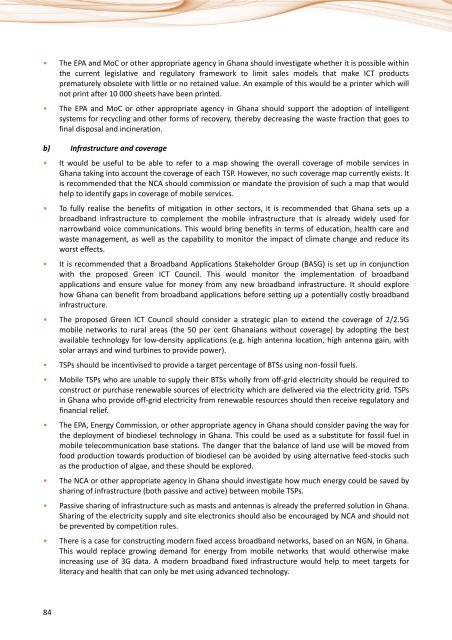Information and communication technologies (ICTs) and ... - ITU
Information and communication technologies (ICTs) and ... - ITU
Information and communication technologies (ICTs) and ... - ITU
Create successful ePaper yourself
Turn your PDF publications into a flip-book with our unique Google optimized e-Paper software.
• The EPA <strong>and</strong> MoC or other appropriate agency in Ghana should investigate whether it is possible within<br />
the current legislative <strong>and</strong> regulatory framework to limit sales models that make ICT products<br />
prematurely obsolete with little or no retained value. An example of this would be a printer which will<br />
not print after 10 000 sheets have been printed.<br />
• The EPA <strong>and</strong> MoC or other appropriate agency in Ghana should support the adoption of intelligent<br />
systems for recycling <strong>and</strong> other forms of recovery, thereby decreasing the waste fraction that goes to<br />
final disposal <strong>and</strong> incineration.<br />
b) Infrastructure <strong>and</strong> coverage<br />
• It would be useful to be able to refer to a map showing the overall coverage of mobile services in<br />
Ghana taking into account the coverage of each TSP. However, no such coverage map currently exists. It<br />
is recommended that the NCA should commission or m<strong>and</strong>ate the provision of such a map that would<br />
help to identify gaps in coverage of mobile services.<br />
• To fully realise the benefits of mitigation in other sectors, it is recommended that Ghana sets up a<br />
broadb<strong>and</strong> infrastructure to complement the mobile infrastructure that is already widely used for<br />
narrowb<strong>and</strong> voice <strong>communication</strong>s. This would bring benefits in terms of education, health care <strong>and</strong><br />
waste management, as well as the capability to monitor the impact of climate change <strong>and</strong> reduce its<br />
worst effects.<br />
• It is recommended that a Broadb<strong>and</strong> Applications Stakeholder Group (BASG) is set up in conjunction<br />
with the proposed Green ICT Council. This would monitor the implementation of broadb<strong>and</strong><br />
applications <strong>and</strong> ensure value for money from any new broadb<strong>and</strong> infrastructure. It should explore<br />
how Ghana can benefit from broadb<strong>and</strong> applications before setting up a potentially costly broadb<strong>and</strong><br />
infrastructure.<br />
• The proposed Green ICT Council should consider a strategic plan to extend the coverage of 2/2.5G<br />
mobile networks to rural areas (the 50 per cent Ghanaians without coverage) by adopting the best<br />
available technology for low-density applications (e.g. high antenna location, high antenna gain, with<br />
solar arrays <strong>and</strong> wind turbines to provide power).<br />
• TSPs should be incentivised to provide a target percentage of BTSs using non-fossil fuels.<br />
• Mobile TSPs who are unable to supply their BTSs wholly from off-grid electricity should be required to<br />
construct or purchase renewable sources of electricity which are delivered via the electricity grid. TSPs<br />
in Ghana who provide off-grid electricity from renewable resources should then receive regulatory <strong>and</strong><br />
financial relief.<br />
• The EPA, Energy Commission, or other appropriate agency in Ghana should consider paving the way for<br />
the deployment of biodiesel technology in Ghana. This could be used as a substitute for fossil fuel in<br />
mobile tele<strong>communication</strong> base stations. The danger that the balance of l<strong>and</strong> use will be moved from<br />
food production towards production of biodiesel can be avoided by using alternative feed-stocks such<br />
as the production of algae, <strong>and</strong> these should be explored.<br />
• The NCA or other appropriate agency in Ghana should investigate how much energy could be saved by<br />
sharing of infrastructure (both passive <strong>and</strong> active) between mobile TSPs.<br />
• Passive sharing of infrastructure such as masts <strong>and</strong> antennas is already the preferred solution in Ghana.<br />
Sharing of the electricity supply <strong>and</strong> site electronics should also be encouraged by NCA <strong>and</strong> should not<br />
be prevented by competition rules.<br />
• There is a case for constructing modern fixed access broadb<strong>and</strong> networks, based on an NGN, in Ghana.<br />
This would replace growing dem<strong>and</strong> for energy from mobile networks that would otherwise make<br />
increasing use of 3G data. A modern broadb<strong>and</strong> fixed infrastructure would help to meet targets for<br />
literacy <strong>and</strong> health that can only be met using advanced technology.<br />
84

















